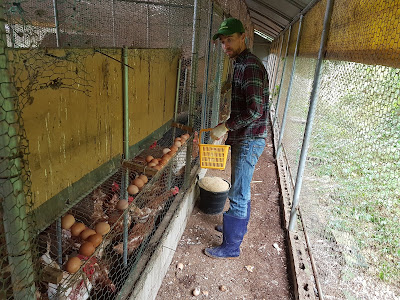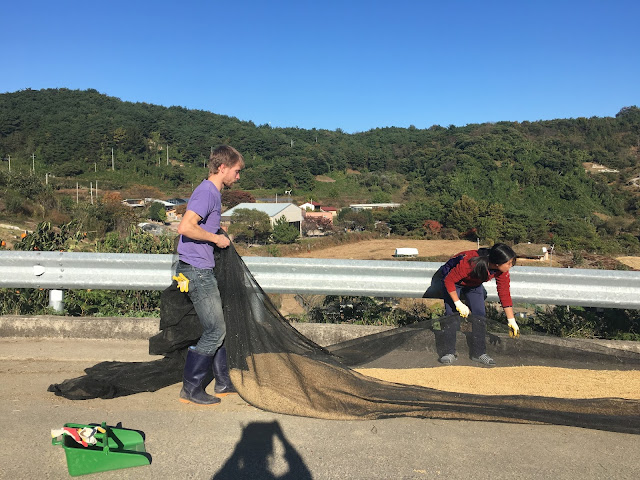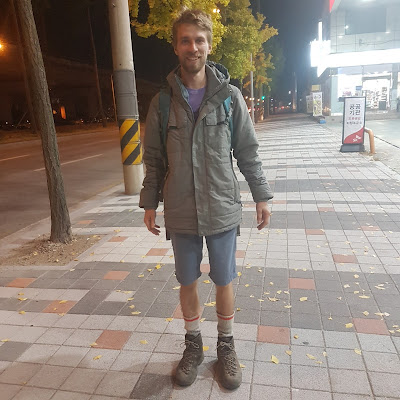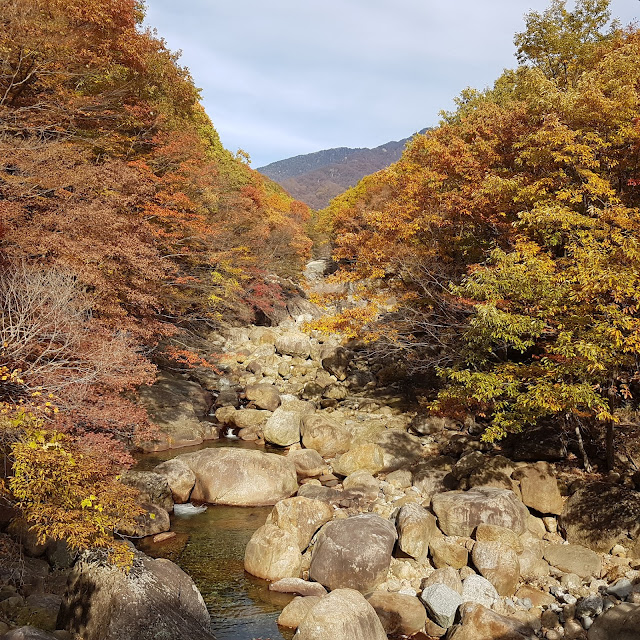I.
My assignment at Dandelion has been terminated. The reason is medical, based on the relatively short amount of time remaining and my counselor's opinion that an immediate return is not ideal.
I disagree with the decision. Even at the height of my episode at the end of January, I disagreed with the decision to send me home. I felt I could have continued to perform my duties at Dandelion without going home.
I don't repent of that opinion either. I know myself. Tree planting is a tough job, but I know I will be one of the toughest on the crew. I won't quit before the season's done, and I'll start to heat up at the end when most people are struggling to finish.
So what? What am I trying to prove?
II.
In his work on St. Augustine, former Archbishop of Canterbury Rowans Williams distinguishes between two views of how suffering builds character.
Williams describes the first as the "moralistic" view. On this view, suffering is seen as an opportunity to do the right thing. Maybe it hurts you to do right by someone, but you do it anyway. The suffering continues because your action is not designed to get you out of your own suffering but to do right by the other person. In this way, suffering also teaches you endurance. By going through suffering, you thus become a "moral athlete."
This is the type of "character building" that happens during tree planting. You learn perseverance, but, it must be said, in the service of a shallow view of "doing the right thing." You kill yourself out of a loyalty to your foreman and crew, and the commitment you made at the beginning of the season.
I think that having a shallow view of "doing the right thing" is often a weakness of this view of suffering, more generally. How do you know you are "doing the right thing"?
Friedrich Nietzsche, someone with a profound understanding of human psychology and morality, knew this as well. In Ecce Homo, he writes: "My experiences entitle me to be quite generally suspicious of the so-called 'selfless' drives, of all 'neighbor love' that is ready to give advice and go into action" (228).
Who knows what could be lurking beneath my "moralistic" drives? Maybe I wanted people to eventually notice how enduring and selfless I was, and get rewarded. Maybe focusing on others was my way of indulging in a "will to death," or "will to failure," as my own dreams crumbled. Maybe I wanted to prove that a Christian view of love will win out because I did not trust God to prove that without me. Maybe this is the original sin: to think of yourself more highly than God.
Who knows what could be lurking beneath my "moralistic" drives? Maybe I wanted people to eventually notice how enduring and selfless I was, and get rewarded. Maybe focusing on others was my way of indulging in a "will to death," or "will to failure," as my own dreams crumbled. Maybe I wanted to prove that a Christian view of love will win out because I did not trust God to prove that without me. Maybe this is the original sin: to think of yourself more highly than God.
A professor of mine once described consciousness as a spider monkey sitting on the shoulders of a gorilla, trying frantically to get the gorilla to look in the right direction. So just because we think we are being selfless or loving our neighbor, doesn't mean that that is what we are really up to. Our conscious efforts are seated on a much deeper, more persistent aspect of our personality.
Augustine also recognizes this about us. As Rowan Williams writes:
"Augustine's undiminished appeal to a post-Freudian generation has much to do with this aspect of his thought. He confronts and accepts the unpalatable truth that rationality is not the most important factor in human experience, that the human subject is a point in a vast structure of forces whose operation is entirely obscure to reason" (73).
This is a serious limit to viewing suffering as an opportunity for "moral athleticism."
III.
However, as Williams points out, Augustine's view of suffering is more profound than this.
Augustine sees suffering as having more to do with a revelation of God's grace than an opportunity for our own works. Through our suffering, we learn the hard truth that all the good things around us are not God but his gifts, and that, therefore, they are finite things which pass away and cannot fulfill our longings for meaning and intimacy. This is a revelation that, if internalized, might help us to get us through our grandiose delusions concerning the moral worth of our "athleticism."
But how are we to internalize it? Am I the only one who has trouble desiring God more than human intimacy and meaningful work? As I am, it is difficult to see myself "at rest" without these things.
During my episode, at least this much of my own heart was revealed: I do not want to be drawn into the Trinitarian life of God alone; I would rather get lost along the way to God and rest in the shade of the divine light. There I could enjoy an eternal intimacy with the people I love, with all the hurt and misunderstanding overcome. There I could laugh and cry and enjoy the presence of those people (perhaps especially a young lady) who God made me to be especially compatible with in the depths of my being.
The abrupt end of the meaningful work and intimate friendships I was just experiencing on my assignment is perhaps an opportunity to learn some theological realism. We don't get what we desire because we do not yet desire according to the truth of things. The following passage in Williams' study expresses a truth that hits close to home:
"The Confessions return often to the theme of friendship and its intense importance in Augustine's life; yet here -- almost as an aside -- is the mature man's judgment on the tantalizing inadequacy of human intimacy. The heart cannot rest even in the heart of another; and this is not the smallest of incomprehensible griefs of human life" (77).
IV.
I am beginning to see that my situation is no longer an opportunity for 'moral athleticism.' The original, measurable goals of my assignment were not completed. And so it is clear that my own finitude has resulted in failure.
Finitude, failure and the suffering that comes with it, is not sin. On the contrary, Augustine points out that Christ too suffered in the finitude of humanity. Christ suffered weakness, rejection, betrayal and psychological anguish. Augustine infers that, if Christ went through this, then going through it cannot be considered sin. There is no reason to feel guilt because of a bad result.
Pushing further into Christ's suffering, Augustine sees how it, even more than our own suffering, reveals the character of the world: "a world that crucifies its God, crucifies compassion, that crucifies beauty" (80). The point is driven home. If "doing the right thing" is modelled on Christ's interactions with the world, then there is no choice but to come to terms with suffering, with failure, with the finitude of the things of the world.
We are forced to keep our eyes on God. When we do this, we see that he is with us in our suffering. This is the story of the cross, and Christ's work after the victory of his resurrection as well. On the Damascus road, Jesus identifies with the suffering church: "Why do you persecute me?" In the last days, he will identify with the suffering poor of the world: "I was hungry and you gave me something to eat" (v. 35).
Am I ready to accept the lesson that my heart is restless until it rests in God?
Even now, as I accept the limits of my moral athleticism, I do not want to learn Augustine's lesson. Even now, I am not fully convinced of it. It is hard for me to see how I could be happy apart from God's gifts.
The opportunity now is to accept God's grace, despite the finitude of his gifts, despite the failure of my work. If there is any story that will break my hard heart toward God, it is the story of God identifying with us in our suffering at cross.
Finitude, failure and the suffering that comes with it, is not sin. On the contrary, Augustine points out that Christ too suffered in the finitude of humanity. Christ suffered weakness, rejection, betrayal and psychological anguish. Augustine infers that, if Christ went through this, then going through it cannot be considered sin. There is no reason to feel guilt because of a bad result.
Pushing further into Christ's suffering, Augustine sees how it, even more than our own suffering, reveals the character of the world: "a world that crucifies its God, crucifies compassion, that crucifies beauty" (80). The point is driven home. If "doing the right thing" is modelled on Christ's interactions with the world, then there is no choice but to come to terms with suffering, with failure, with the finitude of the things of the world.
We are forced to keep our eyes on God. When we do this, we see that he is with us in our suffering. This is the story of the cross, and Christ's work after the victory of his resurrection as well. On the Damascus road, Jesus identifies with the suffering church: "Why do you persecute me?" In the last days, he will identify with the suffering poor of the world: "I was hungry and you gave me something to eat" (v. 35).
V.
Even now, as I accept the limits of my moral athleticism, I do not want to learn Augustine's lesson. Even now, I am not fully convinced of it. It is hard for me to see how I could be happy apart from God's gifts.
The opportunity now is to accept God's grace, despite the finitude of his gifts, despite the failure of my work. If there is any story that will break my hard heart toward God, it is the story of God identifying with us in our suffering at cross.






























